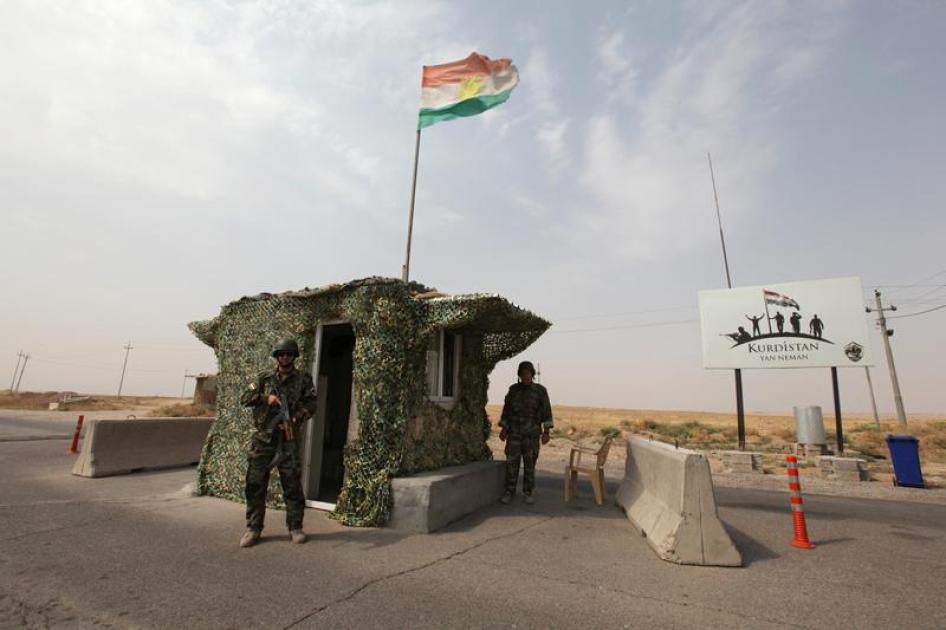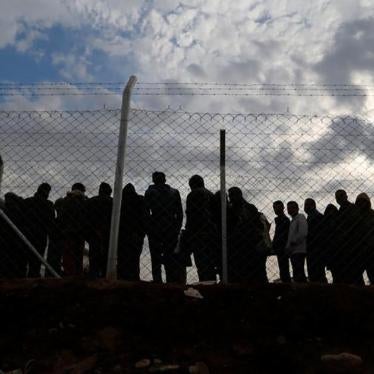Update: Following the publication of Human Rights Watch’s report “Kurdistan Region of Iraq: Thousands Fleeing Kept Waiting Near Front Line” on June 21, 2017, Human Rights Watch received the following statement from the Kurdistan Regional Government.
(Beirut) – The Kurdistan Regional Government’s (KRG) Peshmerga forces are stopping thousands of civilians fleeing territory held by the Islamic State (also known as ISIS) for up to three months at checkpoints, including on the front lines, apparently based on general security concerns, and in many cases preventing their access to humanitarian assistance, Human Rights Watch said today. The KRG is obliged to facilitate rapid and unimpeded humanitarian assistance to all civilians in need and to allow those fleeing to reach safety.
The civilians, including entire families, have been fleeing Hawija, 60 kilometers south of Mosul, and Tal Afar, 55 kilometers west of Mosul, which have been under the control of ISIS since June 2014. There are still 80,000 civilians in Hawija and another 20,000 in Tal Afar, United Nations staff told Human Rights Watch.
“All armed forces in Iraq should be doing their utmost to help civilians reach safety, and to get food, water and medicine,” said Lama Fakih, deputy Middle East director at Human Rights Watch. “The situation will become even more urgent when anti-ISIS forces begin operations to retake Hawija and Tal Afar.”
Four individuals with their families, who had been stopped at checkpoints, and two people with direct knowledge of the movement of people fleeing these areas told Human Rights Watch that at each of the four checkpoints where families tried to enter KRG-held territory, Peshmerga forces stopped civilians for days, weeks, and even in one case up to three months, in many cases leaving them vulnerable to ISIS mortar and suicide attacks and without food and badly needed assistance.
One man who was held at a checkpoint with his family for three days in Maktab Khalid, a destroyed village on the frontline and within ISIS shelling range, said: “I spent those three days scared that ISIS would kill all of us, and, at the same time, that my children would freeze to death. Those three days were the most horrible days of my life.”
Another described how his 6-month-old baby died of lack of milk as his family waited to be allowed to cross.
One of those with direct knowledge of the movement of people fleeing via the Maktab Khalid crossing told Human Rights Watch that on several occasions in April and May 2017, Peshmerga forces prevented dozens of civilians from crossing for up to 14 days and prevented humanitarian organizations from delivering humanitarian assistance to them. Another person with direct knowledge of the movement of people fleeing via the Peshmerga’s Daquq checkpoint, 17 kilometers from the frontline, also said that Peshmerga forces prevented civilians from crossing there for up to 16 days and limited their access to aid.
An Iraqi government official said that he interviewed dozens of families who had passed through Maktab Khalid over the past year who said that when they arrived Peshmerga forces took their names and then told them that they would only allow them to cross once the size of the crowd had reached at least 300 families. He said that he raised concerns about not allowing the civilians to cross in a timely way with the Kirkuk governor and Peshmerga commanders, and was told these measures were needed to screen civilians for ISIS affiliation before allowing them through.
This stated security rationale, however, contradicts statements from families who told the official and Human Rights Watch that they were only allowed to cross when large numbers amassed at the checkpoint. Other families said that when they arrived, a large number of families were already at the checkpoint, they were only kept for a few hours before being allowed to cross.
Since April 18, more than 5,000 people fleeing Tal Afar attempted to enter KRG-held territory via a Peshmerga checkpoint in Shindukhan, a village on the front lines, and were held by Peshmerga forces there for one to three days with no food, water, or shelter before they were taken to Sahlej, a nearby village 10 kilometers from the frontline and within ISIS shelling range, said one of the people with direct knowledge of the movement of people fleeing in the area.
According to the UN, Peshmerga forces held an estimated 200 civilians fleeing Tal Afar for more than two months at a checkpoint in al-Fadhilya, 15 kilometers north of Mosul and 22 kilometers from the frontline. Aid agencies and partners were not allowed direct access to provide aid. A source following developments said that in early June, after three months, the families were allowed through and on to camps for displaced people.
In June 2017, Human Rights Watch shared its findings with the KRG’s High Committee to Evaluate International Organizations’ Reports and asked for comment but at the time of publication had not received a response.
Security forces may have genuine security concerns and are entitled to screen those fleeing ISIS-controlled areas. But authorities should make medical care, including first aid, promptly available to everyone at screening sites. Authorities running the screening centers should locate them as far from hostilities as possible. Authorities should also promptly identify vulnerable people and give them priority in the screening process, including those needing immediate medical assistance, and provide them with any assistance needed including shelter, food, milk for infants, and water.
Under international humanitarian law, parties to the conflict should take all feasible steps to evacuate the civilian population from the vicinity of fighting or military objects, and take all feasible precautions to protect civilians from harm. All parties are also obliged to facilitate rapid and unimpeded humanitarian assistance to all civilians in need. KRG authorities should ensure prompt independent judicial review of detention and allow detainees to have access to lawyers and medical care and to communicate with their families. Anyone held for an extended period without being able to leave should be considered as being detained.
“These families have lived for years under the horrific abuses of ISIS, months with limited food, water, and medicine, and have just risked their lives trying to get to safety,” Fakih said. “Delaying people fleeing ISIS from reaching safety and getting the help they need is inhumane.”
Families Describe Being Held at Checkpoints
Many families fleeing Hawija and Tel Afar have tried to enter KRG-held territory via several main checkpoints, including at Maktab Khalid, 15 kilometers west of Kirkuk; Daquq, 30 kilometers south of Kirkuk; Shindukhan, 40 kilometers northwest of Mosul; and al-Fadhilya, 15 kilometers north of Mosul.
Human Rights Watch interviewed four men who said they and their families were kept at Maktab Khalid for between one and three days.
One man from Hawija said he arrived at Maktab Khalid in November 2016, with six members of his family and enough food for one meal for the whole family. He said that Peshmerga officers prevented him and his family and hundreds of others from crossing for three days, saying they would only let families cross once the number waiting was big enough. The family sought shelter in a destroyed, abandoned building with no blankets. During that time, on a few occasions, officers gave him a bit of dry bread, which he gave to his children, he said.
Despite raising concerns with a Peshmerga officer at the checkpoint about ISIS attacks and his family’s security, he said the officer dismissed these saying, “Your safety is not our responsibility. We are not responsible if ISIS attacks you because you are not yet in our territory.” He added:
By the third morning, my 9-year-old daughter was no longer moving or speaking, because of the severe cold and the lack of food. When they finally let us through, I had to carry her the whole way. Finally, an officer gave her some water.
Another man, 25, from Hawija, who arrived at Maktab Khalid on December 24 with his family and about 300 other people said Peshmerga officers informed him that they would only allow the families to cross once there were more than 500 people there. He said he was able to call relatives in Kirkuk who delivered them food via Peshmerga officers there but that in the three days they were there many other families went without. “We were lucky, but many families spent those days without any food,” he said. “I saw old men and women too weak to walk by the last day.”
Another man from Hawija said he reached Maktab Khalid in January, with his family and about 200 other people, only to have Peshmerga forces stop them there for days without any food. He said:
My 6-month-old son, Khalid, started crying on the first day, it was so cold and we had no milk to give him, because my wife had not eaten for three days. I went to the Peshmerga officers and asked if they had any food or milk, but they said they didn’t. I begged them to let us cross but they refused, saying the number of people had to be bigger before they would let us all cross. I knew Khalid would die, and he did the next day. It was a sad day for me. I escaped ISIS in order to give my children a chance to survive and have a better life, but I lost him. I had to bury him right there in the desert.
The man said that his daughter, Khalid’s twin sister, survived but suffered severe dehydration. She was still receiving medical treatment when Human Rights Watch interviewed him on May 23.
The person who had knowledge of people who were stopped at Maktab Khalid said that 140 civilians were stopped on April 3 for 14 days and that assistance was only provided on Day 10; that 81 civilians were stopped on April 18 for six days; 31 on May 5 for 12 days, with assistance after nine days; 61 including eight with critical health conditions, on May 27, with two critically ill civilians allowed to cross around May 30, and the rest held for nine days.
One of the people with knowledge of the Daquq checkpoint said that eight families were stopped on April 3 for 16 days, with a local aid group only able to provide them 10 assistance kits containing food and water.
Then, on May 15, the source said the Peshmerga stopped a family with a sick elderly family member. The ailing woman was taken to a hospital on May 20, but returned later the same day. Her situation continued to deteriorate and on May 24 the family requested that the Peshmerga forces take her back to the hospital, but they refused. The person said that the Peshmerga refused permission for aid to be delivered at the end of May and as of June 6, the family was still stuck there, and had been joined by two more families.
An Iraqi government official confirmed the presence of the three families, saying the relatives had contacted him with the same concerns.









